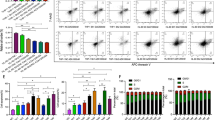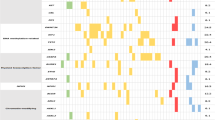Abstract
Objectives
To investigate the relationship between gene mutations and response to Compound Qinghuang Powder (复方青黄散, CQHP) in patients with myelodysplastic syndrome (MDS).
Methods
Forty-three MDS patients were genotyped by ultra-deep targeted sequencing and the clinical data of patients were collected and the relationship between them was analyzed.
Results
Up to 41.86% of patients harbored genet mutations, in most cases with more than one mutation. The most common mutations were in SF3B1, U2AF1, ASXL1, and DNMT3A. After treatment with CQHP, about 88.00% of patients no longer required blood transfusion, or needed half of prior transfusions.
Conclusions
CQHP is an effective treatment for patients with MDS, especially those with gene mutations in SF3B1, DNMT3A, U2AF1, and/or ASXL1.
Similar content being viewed by others
References
Garcia-Manero G. Myelodysplastic syndromes: 2015 update on diagnosis, risk-stratification and management. Am J Hematol 2015;90:831–841.
Papaemmanuil E, Gerstung M, Malcovati L. Clinical and biological implications of driver mutations in myelodysplastic syndromes. Blood 2013;122:3616–3627.
Haferlach T, Nagata Y, Grossmann V. Landscape of genetic lesions in 944 patients with myelodysplastic syndromes. Leukemia 2014;28:241–247.
Zhang L, Padron E, Lancet J. The molecular basis and clinical significance of genetic mutations identified in myelodysplastic syndromes. Leuk Res 2015;39:6–17.
Smith AE, Mohamedali AM, Kulasekararaj A. Next generation sequencing of the TET2 gene in 355 MDS and CMML patients reveals low-abundance mutant clones with early origins, but indicates no definite prognostic value. Blood 2010;116:3923–3932.
Hu XM, Liu F, Ma R. Application and assessment of Chinese arsenic drugs in treating malignant hematopathy in China. Chin J Integr Med 2010;16:368–477.
Ma JL, Qu WW, Hu XM. Arsenic preparation for application in the treatment of myelodysplastic syndrome. Chin J Clin (Electr ed, Chin) 2012;6:149–150.
Hu XM, Wang HZ, Mao C, Liu C, Li L, Zheng CM, et al. Clinical significance of trisomy 8 and monosomy 7/7q deletion in myelodysplastic syndrome. J Clin Hematol (Chin) 2006;19:340–343.
Hu XM, Ma JL, Ma R. Selectivity of treatment to clone category in patients with myelodysplastic syndromes. J Leuk Lymph (Chin) 2011;20:759–761.
Ma JL, Qu WW, Hu XM. Correlationship of clonal selection of treatment with arsenious compound formula Qinghuang Powder with in vivo effects of arsenic in patients with myelodysplastic syndrome. Chin J Inf Tradit Chin Med (Chin) 2013;20:5–8.
Sun SZ, Ma R, Hu XM, Yang XH, Xu YG, Wang HG, et al. Karyotype and DNA-methylation responses in myelodysplastic syndromes following treatment with traditional Chinese formula containing arsenic. Evid Based Complement Alternat Med 2012;2012:969476.
Vanlet P, Horny HP, Bennet JM, Christa F, Ulrich G, Peter G, et al. Definitions and standards in the diagnosis and treatment of myelodysplastic syndromes: consensus statements and report from a working conference. Leuk Res 2007;31:727–736.
Swerdlow SH, Campo E, Harris NL, Jaffe ES, Pileri SA, Stein H, et al, eds. WHO classification of tumours of haematopoietic and lymphoid tissues. Lyon, France: IARC; 2008:88–93.
Shaffer LG, Tommerup N, eds. An international system for human cytogenetic nomenclature. Basel: S. Karger Publishers; 2005.
Tefferi A, Barosi G, Mesa RA, Cervantes F, Deeg HJ, Reilly JT, et al. International Working Group (IWG) consensus criteria for treatment response in myelofibrosis with myeloid metaplasia, for the IWG for Myelofibrosis Research and Treatment (IWG-MRT). Blood 2006;108:1497–1503.
Zheng XY, ed. Guidelines for the clinical research of traditional Chinese medicine (Trial). Beijing: China Medical Science and Technology Press; 2002:19–20.
Hu XM, Ma R, Xu YG, GUO XQ, Xu S, Liu F, et al. Application of Qinghuang Powder in treating hematologic malignancies. Int J Tradit Chin Med (Chin) 2011;33:568–570.
Xu S, Ma R, Hu XM. Clinical observation on Qinghuang Powder for treatment of 31 cases of myelodysplastic syndrome. J Tradit Chin Med (Chin) 2006;47:514–516.
Xu S, Hu XM, Xu YG, Yang XH, Wang HZ, Liu F, et al. Effect of treatment for myelodysplastic syndrome by Qinghuang Powder combined with Chinese herbs for reinforcing Shen and strenghening Pi. Chin J Integr Chin West Med (Chin) 2008;28:216–219.
Liu F, Guo XQ, Hu XM, Xu YG, Wang HZ, Yang XH, et al. Effect of Qinghuang Powder in treating 36 patients with myelodysplastic syndrome. J Tradit Chin Med (Chin) 2011;52:241–242.
Xu S, Ma R, Hu XM, Xu YG, Yang XH, Wang HZ, et al. Clinical observation of the treatment of myelodysplastic syndrome mainly with Qinghuang Powder. Chin J Integr Med 2011;17:834–839.
Wang Y, Fang S, Song MM, Hu XM. Safety of compound Qinghuang powder in patients with myelodysplastic syndromes. Int J Tradit Chin Med (Chin) 2014;37:1074–1077.
Wang Y, Fang S, Deng ZY, Song MM, Ma JL, Yang XP, et al. Compound Qinghuang Powder in the treatment of patients with myelodysplastic syndromes. Int J Tradit Chin Med (Chin) 2015;37:1091–1095.
Wang FR, Lou YQ, Lu DP. Study on clinical pharmacokinetics of oral Tetraarsenic tetrasulfide. Chin J Hematol (Chin) 2005;26:44–46.
Ni JH, Chen GQ, Shen ZX, Li XS, Liu HW, Huang YT, et al. Pharmacokinetics of intravenous arsenic trioxide in the treatment of acute promyelocytic leukemia. Chin J Hematol (Chin) 1997;18:250–253.
Hu XM, Tanaka S, Onda K, Yuan B, Toyoda H, Ma R, et al. Arsenic disulfide induced apoptosis and concurrently promoted erythroid differentiation in cytokine-dependent myelodysplastic syndrome-progressed leukemia cell line F-36p with complex karyotype including monosomy 7. Chin J Integr Med 2014;20: 387–393.
Hu XM, Yuan B, Tanaka S, Song MM, Onda K, Tohyama K, et al. Arsenic disulfide-triggered apoptosis and erythroid differentiation in myelodysplastic syndrome and acute myeloid leukemia cell lines. Hematology 2014;19:352–360.
Hu XM, Yuan B, Song MM, Onda K, Tanaka S, Toyoda H, et al. Dose-dependent biphasic effects of arsenic disulfide on differentiation and apoptosis of HL-60 cells. Curr Topics Pharmacol (Chin) 2014;17:13–25.
Hu XM, Yuan B, Tanaka S, Zhou QB, Onda K, Toyoda H, et al. Involvement of oxidative stress associated with glutathione depletion and p38 MAPK activation in arsenic disulfide-induced differentiation in HL-60 cells. Leuk Lymphom 2014;55:392–404.
Author information
Authors and Affiliations
Corresponding authors
Additional information
Supported by the Beijing Municiple Science and Technology Commission (No. Z141100006014003), the National Natural Science Foundation of China (No. 81673821), and the Special Research Foundation of Central Level Public Scientific Research Institutes (No. ZZ10-016)
Rights and permissions
About this article
Cite this article
Zhao, P., Liang, Jb., Deng, Zy. et al. Association of Gene Mutations with Response to Arsenic-Containing Compound Qinghuang Powder (复方青黄散) in Patients with Myelodysplastic Syndromes. Chin. J. Integr. Med. 25, 409–415 (2019). https://doi.org/10.1007/s11655-018-2977-3
Received:
Published:
Issue Date:
DOI: https://doi.org/10.1007/s11655-018-2977-3




